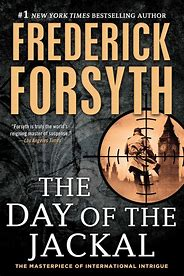The Day Of Their Return, 15.
Ivar and Erannath, fugitives, tell an Orcan man a story about being marooned scientists, needing transport. Not believing them but resenting the Terrans, he drives them where they want to go in the back of his truck. In Frederik Forsyth's The Day Of The Jackal, a Frenchman has in fact seen the man that the gendarmes are after, the Jackal, but tells them that he has seen no one. There is a general opposition to authority in some European countries.
Aycharaych, manipulating the prophet, Jann, through the imposed secondary personality of "Caruith," argues that the man who had helped Ivar and Erannath is unreliable and must be killed - a sure sign that "Caruith" is no enlightened being. In CS Lewis' That Hideous Strength, Mark Studdock's employers tell him that they have evidence that he has committed murder but they are prepared to cover it up because he is one of them - a sure sign that they are not to be trusted! In fact, it is they that are guilty of the murder. We see similar deceits practised in diverse works of fiction and in real life.

8 comments:
Kaor, Paul!
IIRC, there was another Biblical allusion there! "Caruith" insidiously used the High Priest Caiaphas' argument that it was better for one man to die than for the nation to die.
It's common enough with many police forces and prosecutors to offer a deal to criminals guilty of one offence but who knows criminals who perpetrated far worse crimes. If the smaller criminal helps obtain evidence leading to the arrest/conviction of the bigger fish, the smaller fish either gets a break in sentencing or no prison time at all.
Ad astra! Sean
Sean,
That is correct about "Caruith" using Caiaphas' argument.
Paul.
In re the Frenchman not cooperating: it would be more accurate to say that most European countries traditionally had factions which didn't cooperate with the government when someone they disliked was running it. France certainly did.
That would be much less common in, say, Switzerland or Sweden.
Kaor, Mr. Stirling!
The chaotic history of France after 1789 bears out what you said, esp. the miserable history of the strife torn Third Republic.
Ad astra! Sean
The Day of the Jackal was set in 1962, which was during the Fifth Republic - the one whose constitution was written by DeGaulle, and which has lasted - so far - for 55 years, essentially. The Third Republic lasted for 70 years, so a little unclear is was all that "strife-torn."
Kaor, Dave!
I disagree, because anyone who has done some reading up on the histories of the Third and Fifth French republics will find plenty of bitter factional strife and wrangling. And which sometimes slid over to repression from the current regime and/or violence in the streets.
Ad astra! Sean
So not really following your point, then. Neither the Third or Fifth (or Fourth, for that matter) was all that "strife-torn" than the others, in terms of domestic threats, and the Third lasted longer than the Fifth has, so far ...
Kaor, Dave!
I still disagree. Two examples of what I had in mind are from the Third Republic: the brutish way France had State and Church separating and the Affair of the Cards.
Before about 1901 relations between Church had been regulated by the Concordat of 1805, which gave serious concessions to the State. By the later 1800's radical secularists who hated the Church wanted to end the Concordat, which I agree would have been a good idea. But, they chose to do so in the most injurious, insulting, and unilateral way possible. The secularists refused to negotiate with the Papacy to bring about that separation in a calm, friendly way. The radicals used control of the French Assembly to bring about separation in a vicious way, including banning Catholic clergy from working as teachers. They also expelled from France entire orders of nuns working as nurses in the hospitals. And they even refused to return ownership of Catholic houses of worship to the Church.
I think you can imagine how this harassment of the Church would cause deep anger among convinced Catholics and the resulting political turmoil that would cause. And more moderate secularists did not like that harassing.
The Affair of the Cards was when the above mentioned radicals secretly spied on French Army officers, collecting notes about their political and religious views. With special emphasis on passing over for promotion officers known to be devout Catholics. When this spying was exposed in the press, there was a huge furor. There were fist fights in the Assembly, the War Minister who ordered the spying was assaulted, and the gov't soon fell from power. But, even so, the spying lasted till 1913.
The revelation that hostile politicians were evaluating them not for their abilities but for their private views was very demoralizing to French army officers, and with possibly deleterious consequences as WW I began in 1914.
BTW, the Third Republic also had plenty of corruption and fiscal mismanagement.
I did not mention the Fourth Republic because that regime only lasted 12 years, before de Gaulle terminated it in the wake of the Indochinese, Suez Canal, and Algiers catastrophes. But, like the Third, the Fourth was marked by weak, revolving door gov'ts, and factional wrangling. The Fifth has been somewhat stabler, so far, because DeGaulle's constitution gave the president more power than in the two previous regimes. But recent events like the Muslim riots and the Yellow Vest protests does not inspire confidence in it.
Ad astra! Sean
Post a Comment